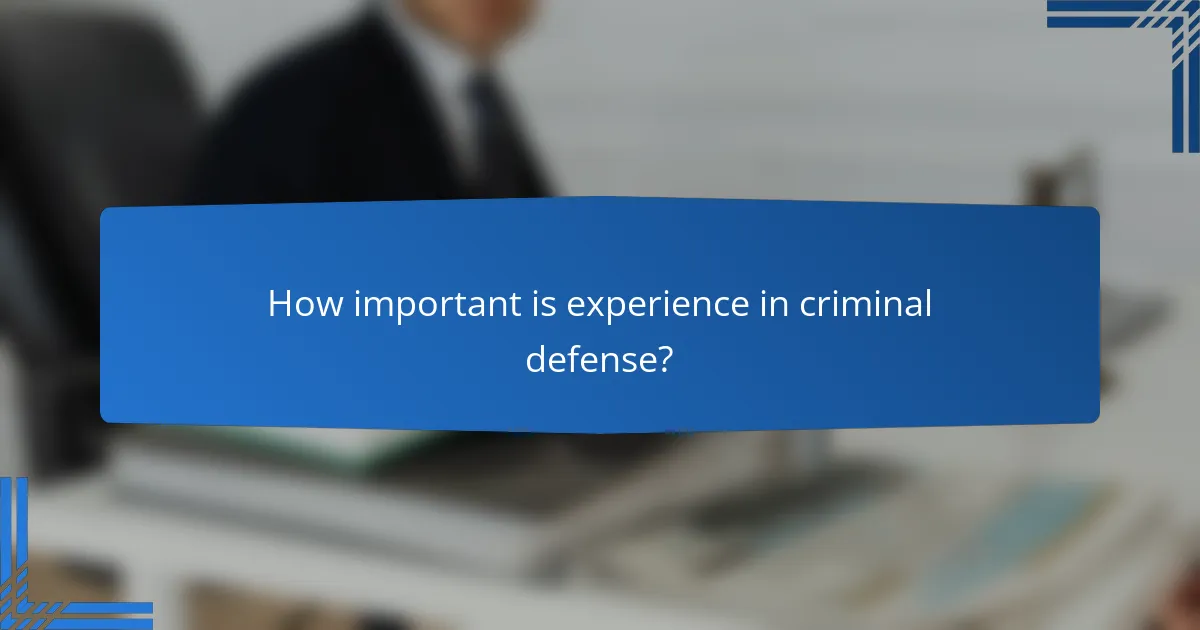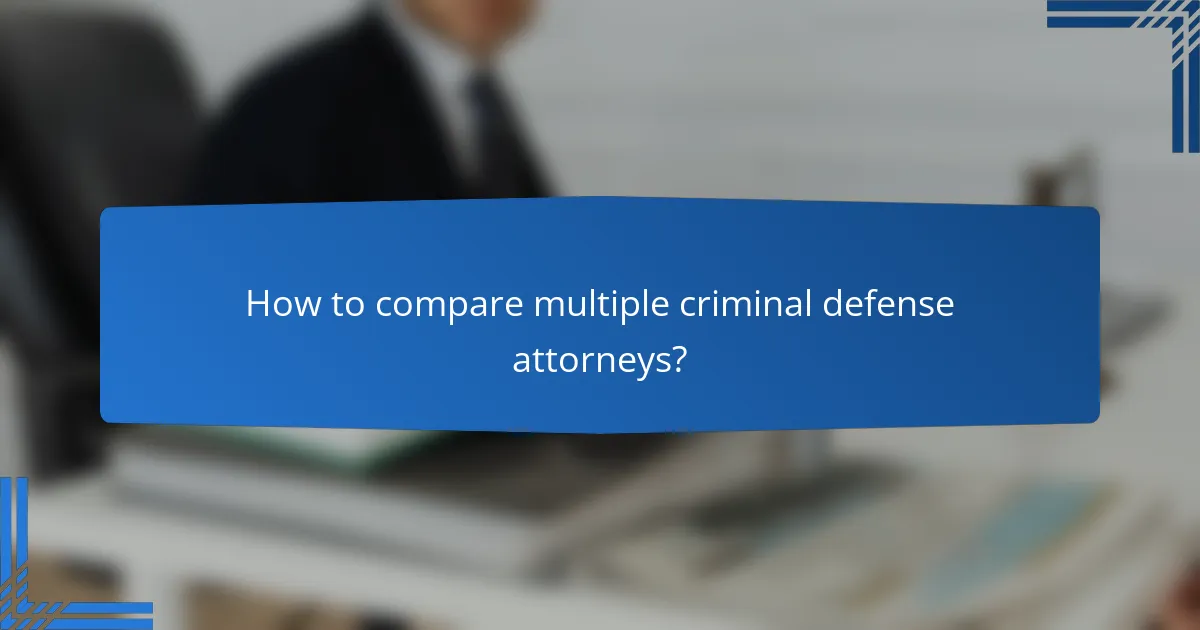When evaluating criminal defense attorneys, it is essential to consider their qualifications, experience, and reputation to ensure effective representation. A qualified attorney should have a Juris Doctor degree, be admitted to the state bar, and ideally possess specialized certifications in criminal law. Experience plays a critical role in navigating complex legal systems and formulating effective defense strategies tailored to specific charges.

How to evaluate criminal defense attorneys in Los Angeles?
To evaluate criminal defense attorneys in Los Angeles, focus on their qualifications, experience, reputation, and disciplinary history. This approach ensures you select a competent attorney who can effectively represent your interests.
Check qualifications and certifications
Start by verifying the attorney’s educational background and any relevant certifications. In California, attorneys must hold a Juris Doctor (JD) degree from an accredited law school and be licensed by the State Bar of California.
Additionally, look for specialized certifications in criminal law, which can indicate a deeper level of expertise. Organizations such as the National Board of Legal Specialty Certification offer such credentials, which can enhance an attorney’s qualifications.
Assess experience with similar cases
Experience is crucial when evaluating criminal defense attorneys. Look for attorneys who have handled cases similar to yours, as familiarity with specific charges can significantly impact the outcome.
Consider the attorney’s years of practice and their success rate in similar cases. An attorney with a solid track record in defending clients against charges like DUI, theft, or drug offenses may be better equipped to navigate your case.
Review client testimonials
Client testimonials provide insight into an attorney’s reputation and effectiveness. Check online reviews on platforms like Avvo or Google, and pay attention to feedback regarding communication, case outcomes, and overall satisfaction.
Additionally, ask for references from the attorney to gain firsthand accounts of their performance. Positive testimonials can indicate a strong rapport with clients and a commitment to achieving favorable results.
Examine disciplinary history
Investigating an attorney’s disciplinary history is essential to ensure you choose a reputable professional. You can check the State Bar of California’s website for any records of disciplinary actions or complaints against the attorney.
A clean disciplinary record suggests that the attorney adheres to ethical standards and maintains a good standing in the legal community. Be cautious of attorneys with multiple complaints or sanctions, as this may reflect poorly on their practice.

What qualifications should a criminal defense attorney have?
A qualified criminal defense attorney should possess a Juris Doctor degree from an accredited law school, be admitted to the state bar, and ideally hold specialized certifications in criminal law. These qualifications ensure that the attorney has the necessary education, legal standing, and expertise to effectively represent clients in criminal cases.
Juris Doctor degree from an accredited law school
A Juris Doctor (JD) degree is essential for any attorney practicing law in the United States. This degree typically requires three years of study at an accredited law school, covering various aspects of law, including criminal law. When evaluating an attorney, confirm that their law school is recognized by the American Bar Association (ABA) to ensure a solid educational foundation.
Additionally, consider the attorney’s academic performance and any honors received during their studies. Graduating in the top percentile can indicate a strong grasp of legal concepts, which is beneficial in complex criminal cases.
State bar admission
Admission to the state bar is a critical qualification for criminal defense attorneys, as it grants them the legal authority to practice law in a specific state. Each state has its own requirements for bar admission, which typically include passing the state bar exam and a character and fitness evaluation. Ensure that the attorney you are considering is in good standing with the state bar.
Being a member of the state bar also allows attorneys to stay updated on local laws and regulations, which can significantly impact the defense strategy in criminal cases. You can verify an attorney’s bar status through the state bar association’s website.
Specialized certifications in criminal law
While not mandatory, specialized certifications in criminal law can enhance an attorney’s qualifications and demonstrate their commitment to this area of practice. Organizations such as the National Board of Legal Specialty Certification offer certifications that require attorneys to meet specific experience and education criteria, as well as pass an examination.
When selecting a criminal defense attorney, look for those who have obtained certifications from reputable organizations. This can indicate a higher level of expertise and a dedication to staying current with developments in criminal law, which can be advantageous in your case.

How important is experience in criminal defense?
Experience is crucial in criminal defense as it directly impacts an attorney’s ability to navigate complex legal systems and advocate effectively for clients. An experienced attorney is more likely to understand the nuances of specific charges and develop effective defense strategies.
Experience with specific charges
When evaluating a criminal defense attorney, consider their experience with the specific charges you face. Different offenses, such as DUI, theft, or drug-related crimes, require distinct legal approaches and knowledge of relevant laws. An attorney familiar with your type of case can better anticipate challenges and devise effective strategies.
For example, an attorney who frequently handles DUI cases will be well-versed in local laws, potential penalties, and effective defenses, which can significantly influence the outcome of your case.
Years of practice in criminal defense
The number of years an attorney has practiced in criminal defense is a strong indicator of their expertise. Generally, attorneys with several years of experience have encountered a wide range of cases and developed a deeper understanding of courtroom procedures and legal tactics.
While there are skilled newer attorneys, those with over five years in criminal defense often have a more extensive network of resources, including expert witnesses and investigators, which can be beneficial for your case.
Track record of successful outcomes
A strong track record of successful outcomes is a key factor in assessing a criminal defense attorney’s effectiveness. Look for attorneys who can demonstrate a history of favorable verdicts, dismissals, or reduced charges for their clients. This information can often be found on their websites or through client testimonials.
Additionally, consider the attorney’s success rate in cases similar to yours. An attorney with a high success rate in handling similar charges may be more adept at negotiating plea deals or winning cases in court.

What role does reputation play in selecting an attorney?
Reputation is crucial when selecting a criminal defense attorney, as it often reflects their ability to achieve favorable outcomes for clients. A well-regarded attorney is likely to have a track record of success, strong relationships within the legal community, and positive feedback from previous clients.
Peer reviews and ratings
Peer reviews and ratings provide insight into an attorney’s professional standing among colleagues. Platforms like Avvo or Martindale-Hubbell allow attorneys to receive ratings based on their experience and client feedback. High ratings can indicate a strong reputation, but it’s essential to read the reviews for context and specifics about the attorney’s strengths and weaknesses.
When evaluating peer reviews, consider the volume of reviews as well as the consistency of feedback. An attorney with numerous positive reviews is generally more reliable than one with only a few ratings, even if those are high.
Online presence and reviews
An attorney’s online presence can significantly influence their reputation. Look for their website, social media profiles, and legal blogs, which can showcase their expertise and approach to cases. Additionally, online reviews on platforms like Google or Yelp can provide a broader perspective on client experiences.
Be cautious of overly positive or negative reviews, as they may not represent the full picture. Aim to find a balance by considering the overall sentiment and specific comments regarding the attorney’s communication, professionalism, and case outcomes.
Reputation within the local legal community
An attorney’s reputation within the local legal community is a strong indicator of their capabilities. This can be assessed through their relationships with judges, prosecutors, and other attorneys. A well-respected attorney is often seen as credible and trustworthy, which can be advantageous in negotiations and court proceedings.
To gauge an attorney’s local reputation, consider asking for referrals from other legal professionals or checking with local bar associations. Participation in community events or legal seminars can also reflect an attorney’s commitment to their practice and reputation in the area.

What are the costs associated with hiring a criminal defense attorney?
The costs of hiring a criminal defense attorney can vary significantly based on factors like the attorney’s experience, the complexity of the case, and the payment structure. Understanding these costs is crucial for budgeting and making informed decisions.
Hourly rates versus flat fees
Criminal defense attorneys typically charge either hourly rates or flat fees. Hourly rates can range from around $100 to over $500 per hour, depending on the attorney’s experience and location. Flat fees, on the other hand, provide a set price for handling a specific case, which can be more predictable and may range from a few thousand to tens of thousands of dollars.
When considering which option to choose, evaluate the complexity of your case. Flat fees might be beneficial for straightforward cases, while hourly rates could be more appropriate for cases requiring extensive legal work.
Payment plans and retainer fees
Many attorneys offer payment plans to help clients manage costs, allowing them to pay in installments rather than a lump sum. A retainer fee is often required upfront, which secures the attorney’s services and is typically deducted from the total cost of legal representation.
Before committing, discuss payment options with your attorney. Ensure you understand how the retainer works and what happens if your case exceeds the initial estimate. This can help avoid unexpected financial burdens later on.

How to compare multiple criminal defense attorneys?
To effectively compare multiple criminal defense attorneys, focus on their qualifications, experience, and reputation. Evaluating these factors can help you identify the best fit for your legal needs.
Create a checklist of qualifications
When assessing criminal defense attorneys, start by creating a checklist of essential qualifications. Look for credentials such as a law degree from an accredited institution, a valid state bar license, and any specialized certifications in criminal law.
Additionally, consider their experience in handling cases similar to yours. An attorney with several years of practice in criminal defense, particularly in your jurisdiction, is likely to have valuable insights into local laws and court procedures.
Finally, check for any disciplinary actions or complaints against the attorney. This information can often be found through your state bar association’s website, ensuring you choose a reputable professional.
